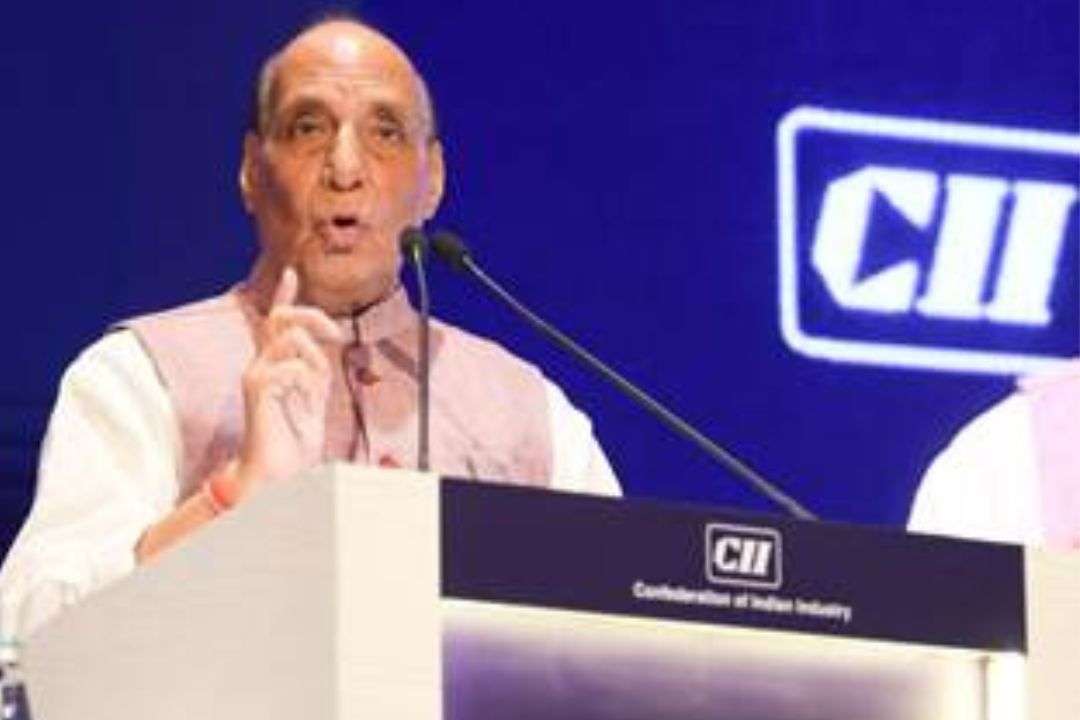Defence Minister Rajnath Singh highlighted the pivotal role of domestic manufacturing in enhancing India’s security capabilities during his address at the Confederation of Indian Industry (CII) Annual Business Summit held in New Delhi on May 29, 2025. He pointed to the effectiveness of Indian-built defence systems during “Operation Sindoor,” a recent counter-terrorism campaign, and underlined that such operations were possible only due to the country’s investment in indigenous defence infrastructure.
Discussing the Advanced Medium Combat Aircraft (AMCA) programme, Shri Singh described its production model as a game-changer, noting that it marks the first time private firms will join forces with public sector entities in building fifth-generation fighter aircraft. The plan includes developing five prototypes before moving into full-scale production.
“This marks a significant leap for the domestic aerospace sector,” Shri Singh stated. He added that the initiative would be a milestone in India’s defence production journey and a bold step toward greater self-sufficiency.
The Defence Minister stressed that India’s success in striking terrorist bases across the border stemmed from its commitment to building indigenous defence strength. He said that the use of homegrown systems proved India’s ability to take decisive and well-calibrated military action.
“We neutralised both terrorist camps and military installations. Though we exercised restraint, we demonstrated the ability to act with precision and purpose,” Shri Singh noted. He also said that India’s counter-terrorism strategy has undergone a major shift, and adversaries now understand that sponsoring terrorism comes with steep consequences. “We’ve adjusted both our diplomatic and military posture accordingly. Talks with Pakistan will focus only on issues related to terrorism and Pakistan-occupied Kashmir (PoK),” he said.
Reaffirming India’s claim over PoK, Shri Singh said that those living there remain deeply connected to India and expressed confidence that they will, in time, reintegrate with the country. Drawing a historical comparison, he said: “Much like Shakti Singh’s bond with Maharana Pratap, the sense of belonging remains firm even after separation.”
Shri Singh outlined the government’s focus on policy clarity, indigenisation, and strategic resilience, stating that collaboration between the government and industry is essential to achieving long-term national goals. He urged companies to put national priorities ahead of narrow business interests, saying: “While business success is your responsibility, serving the nation’s broader interest is your duty.”
Speaking on the summit theme, ‘Building Trust & India First’,Shri Singh said India’s rise as the fourth-largest economy was a reflection not just of economic progress, but of growing global confidence in the country. “India has become a trusted partner in defence technology. We are not just buyers—we’re now manufacturers and exporters,” he said.
Shri Singh shared that defence production has surged from ₹43,000 crore a decade ago to over ₹1.46 lakh crore, with the private sector contributing ₹32,000 crore. Defence exports have also witnessed a massive jump—from around ₹700 crore to over ₹24,000 crore.
Indian-made equipment is now supplied to nearly 100 countries, supported by a robust network of more than 16,000 micro, small, and medium enterprises (MSMEs). These firms not only drive innovation but also provide significant employment, he said.
He added that India is preparing for next-generation warfare by investing in cutting-edge domains like Artificial Intelligence, cybersecurity, unmanned systems, and space security. “Our capability in high-tech defence and precision manufacturing is gaining international recognition,” Shri Singh said.
Calling the industrial sector a key stakeholder in India’s future, Shri Singh stated that reaching the goal of becoming a developed nation by 2047 will require unified efforts. “The strength of a country is measured not just by economic indicators, but by the trust it commands—both among its citizens and globally. That trust depends on national security, internal stability, and the ability to face emerging challenges with confidence,” he concluded.
The event was attended by senior military officials including Admiral Dinesh K Tripathi (Chief of Naval Staff), Air Chief Marshal AP Singh, Lt Gen NS Raja Subramani (Vice Chief of Army Staff), Defence Secretary Rajesh Kumar Singh, DRDO Chairman Dr Samir V Kamat, CII President Sanjiv Puri, and several industry leaders.








